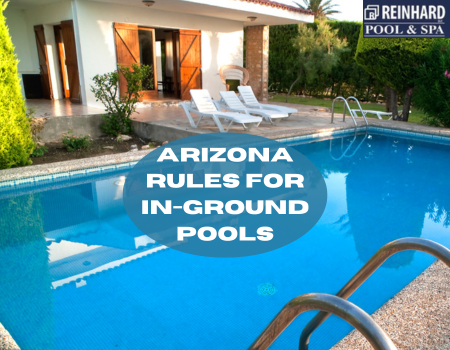Arizona is known for its scorching summers, making in-ground pools a popular feature in many homes. However, pool ownership comes with responsibilities, including ensuring safety and complying with state and local regulations. Arizona has specific rules governing in-ground pools that aim to protect residents, particularly children, from accidents and injuries. Whether you’re planning to install a new pool or already own one, understanding these regulations is crucial to staying compliant and keeping your family safe.
Fencing and Barrier Requirements for In-Ground Pools
One of the most important safety regulations in Arizona involves pool barriers. Arizona law mandates that any in-ground pool must be enclosed by a barrier that meets specific requirements. This rule is in place to prevent accidental drownings, especially in households with children.
 Here are some of the key fencing and barrier regulations:
Here are some of the key fencing and barrier regulations:
- Height: The barrier or fence surrounding the pool must be at least 5 feet tall.
- Distance from the Pool: The barrier should be placed far enough from the pool to prevent children from climbing over and falling into the water.
- Gates and Latches: Gates providing access to the pool area are required to be self-closing and have a self-latching mechanism. The latch should be positioned at least 54 inches from the ground, ensuring it’s out of reach of small children.
- No Climbable Objects: The area around the fence should be free of objects like patio furniture, trees, or other climbable surfaces that children could use to gain access to the pool.
Complying with these fencing rules is not just about avoiding fines—it’s essential for protecting the safety of children and others in your household. For those who need help installing or upgrading their pool barriers, ReinhardPool.com offers reliable and compliant solutions to meet all safety standards.
Pool Cover and Alarm Regulations for In-Ground Pools
In addition to fencing, Arizona law also emphasizes other safety measures like pool covers and alarms. While not always mandatory, these features are strongly recommended, especially in households with children or pets.
- Pool Covers: Installing a secure pool cover when the pool is not in use is a great way to prevent accidents and keep debris out of the water. Covers must be strong enough to support the weight of a person and prevent accidental falls into the pool.
- Alarms: Pool alarms, which alert you if someone enters the pool without your knowledge, are another valuable safety measure. Many Arizona homeowners opt for alarms on doors that lead to the pool area, or even underwater alarms that detect movement in the pool.
Electrical and Plumbing Safety Standards for In-Ground Pools
In-ground pools require proper electrical and plumbing systems, and Arizona has specific regulations to ensure these systems are safe and functional.
- Electrical Equipment: All electrical equipment in the in-ground pool, including heaters, pumps and lighting must comply with both local and national electrical codes. These systems should be installed by licensed electricians to ensure safety.
- Grounding and Bonding: Grounding and bonding are crucial to preventing electrical shock in and around the pool. All metal objects around the pool, including ladders, diving boards, and pool rails, must be properly bonded and grounded.
- Backflow Prevention: Arizona regulations require that the plumbing systems in pools be equipped with backflow prevention devices. These devices ensure that the pool water cannot contaminate the drinking water supply in case of pressure changes.
To ensure peace of mind, have your in-ground pool’s electrical and plumbing systems installed and serviced by qualified professionals.ReinhardPool.com provides expert services in Arizona, ensuring all installations meet the state’s safety codes and standards.
Water Quality and Maintenance for In-Ground Pools
Maintaining clean and chemically balanced water in your pool is essential for both safety and enjoyment. Arizona pool owners must regularly test their pool water and ensure proper filtration to prevent harmful bacteria and algae growth.
Key aspects of water maintenance include:
- pH Levels: The pool’s pH should be maintained between 7.2 and 7.8. This helps maintain water, so that it is neither too acidic nor too alkaline, preventing harm to swimmers and protecting pool equipment from damage.
- Chlorine Levels: Arizona law requires that chlorine levels in public pools remain between 1 and 3 parts per million (ppm) to prevent the growth of bacteria and viruses. Private pools should adhere to similar standards.
- Filtration: Your pool’s filtration system must be regularly cleaned and serviced to maintain optimal water quality. A well-functioning filter removes dirt, debris, and contaminants from the pool water.
Routine water testing is essential, and Reinhard Pool offers comprehensive pool maintenance services, ensuring that your water stays clean, clear, and safe for swimming.
Permits and Inspections for In-Ground Pools
In Arizona, a permit is required for any new pool installation, and existing pools may be subject to inspections to ensure compliance with state and local laws. Depending on the city or county, regulations can vary, so it’s important to check with your local municipality for the specific requirements in your area.
The process typically includes:
- Permit Application: You’ll need to submit plans and apply for a permit before beginning construction on a new in-ground pool. The permit process ensures that the pool will meet all safety and zoning regulations.
- Inspections: After installation, your pool will be inspected to ensure it complies with barrier and electrical safety requirements, as well as other relevant codes.
Working with a professional pool installer like Reinhard Pool can simplify the permitting process. Their team can help you navigate the local regulations and ensure that your pool is installed in compliance with Arizona’s laws.
Owning an in-ground pool in Arizona comes with a number of important safety and regulatory requirements, including fencing, electrical standards, and water maintenance. Adhering to these rules not only ensures that you stay compliant with state laws but also helps protect your family and guests.
